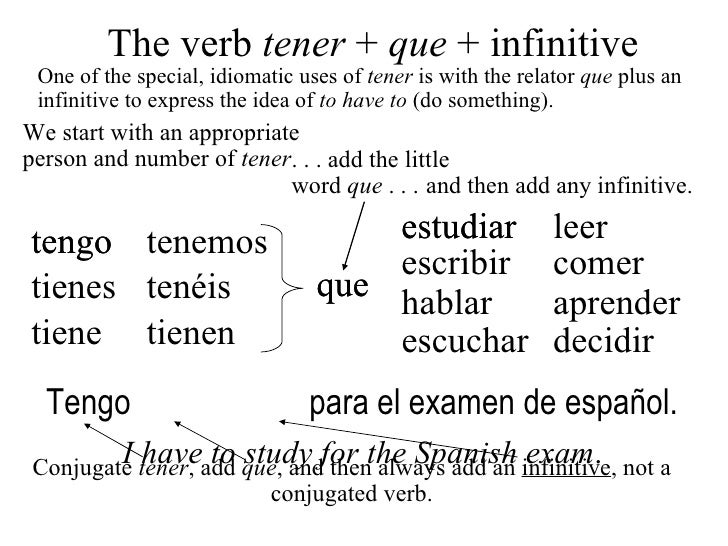Tengo que? Clarification
If the definition of "que" =what, that which, who,if, how does the phrase "tengo que" =I have to? I do not find the definition of que to mean "to".
5 Answers
Richetta:
Tener que is translated as = to have to
The addition of que to the verb creates a new meaning for the phrase. In fact, tener que is a new verb formed from the two words ... a compound verb.
The same thing happens in English: "to get up" can be translated into several different single words in Spanish including "subir" and "levantarse."
In many cases, it is necessary to learn combinations of Spanish words and what these combinations mean in English without picking them apart word for word. (and vice-versa)
In other words, just because "Tengo" means "I have" and "Tengo que" means "I have to," does not mean that one meaning of que is "to" it just "takes on" this meaning when combined with Tener, so it is best not to think "que = to sometimes" because you'll just get more confused.
As you continue studying Spanish you will find many situations where you should not try to pick apart Spanish sentences word for word. Here's another example:
Ella soñó con el actor famoso. She dreamed about the famous actor.
Normally "con" is translated as "with" in English. And "about" is usually translated as "de", "sobre" or "tratarse de". However, in the above sentence, "soñar con" is translated as "to dream about." It is best to learn this as a phrase, not to think that "con" sometimes means "about" because it almost never does unless combined with "soñar" or a few other Spanish verbs.
We have free Video Lessons here under Learn Spanish in the main menu where you can learn about at least 100 things that are different between Spanish and English. Enjoy your learning process!
"Tener + "que" is what you use when you say that you or anybody else "has to" do something. Unlike English, the "to" part is contained in the infinitive that follows whatever form of tener. The "que" doesn't really mean anything in English, it just has to be there. ![]()
Some examples: Tengo que estudiar. = I have to study. Marta tiene que buscar harina para hacer tortillas. = Marta has to look for flour to make tortillas. Los estudiantes tienen que practicar los verbos. = The students have to practice the verbs.

It is from the verb Tener Que
Have a look for it as a conjugation. Find that by clicking on the Menu tab above.
It is easy to see why someone might want to pick apart Tengo que, word for word, because:
Tengo = I have
Tengo que = I have to
Therefore, by subtraction, ¿que = to? (in this case) Easy right?
Try the same process though with Hay que:
Hay = there is or
Hay = there are
Hay que = one must or
Hay que = You (impersonal you) have to or
Hay que = Someone has to or
Hay que = it is necessary to
If you try the same process used to break down Tengo que word for word, you will quickly see the folly of trying to do so in general.
A good structured course of Spanish will encourage you to:
Learn the meanings of individual words and phrases (combinations of two or more words)
Immediately show how these words and phrases are used in complete sentences.
Focus your effort on learning these complete sentences in Spanish. Say them with proper pronunciation and write them perfectly without spelling mistakes, wrong capitalization or missing accent marks. (you might like to try Quizlet to practice this, or use the flashcards here which are integrated with the SpanishDict Video Lessons.)
Almost always, try to avoid the temptation to analyze sentences (and phrases) on a word-for-word basis. If you try to do that you are on the wrong path which will only lead to confusion and heartache.











